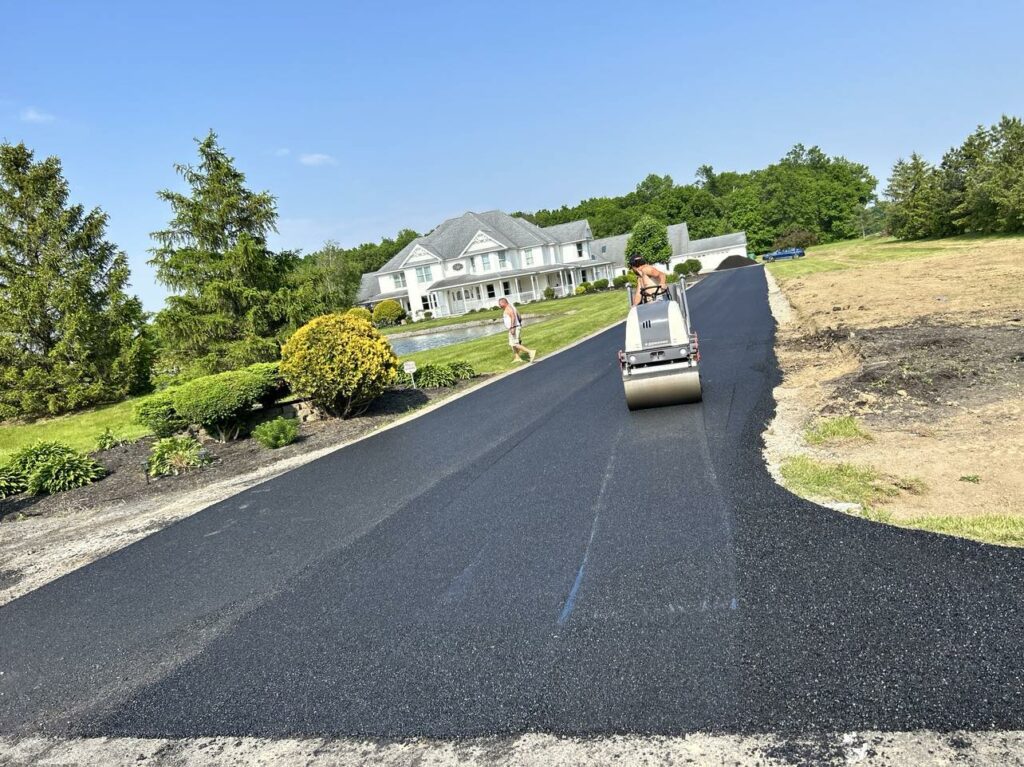Discovering the Numerous Sorts Of Asphalt Paving and Their Advantages
From the durable qualities of Warm Mix Asphalt to the green attributes of Recycled Asphalt Sidewalk, recognizing these options can dramatically affect project outcomes. Advancements such as Warm Mix Asphalt and Porous Asphalt present added layers of effectiveness and sustainability.
Hot Mix Asphalt
When taking into consideration one of the most effective paving solutions, hot mix asphalt (HMA) attracts attention as a top option for numerous applications (paving). HMA is a functional paving product recognized for its toughness, adaptability, and total efficiency. It is generated by home heating asphalt binder and incorporating it with accumulations at heats, making sure an uniform mix that can stand up to different environmental conditions
Among the key advantages of HMA is its capacity to give a smooth, skid-resistant surface, boosting safety and security for automobiles and pedestrians alike. Additionally, HMA exhibits exceptional resistance to contortion, making it ideal for high-traffic locations such as freeways and auto parking lots. Its adaptability to various environments additionally adds to its extensive usage.
The installation process of HMA is relatively fast, permitting effective task completion with very little disturbance to website traffic. Furthermore, it can be recycled, reducing waste and promoting sustainability within the building and construction market. On the whole, warm mix asphalt stays a top option for leading professionals due to its robust performance qualities and lasting cost-effectiveness, making it a dependable service for numerous infrastructure requirements
Cozy Mix Asphalt
Warm mix asphalt (WMA) uses a cutting-edge choice to warm mix asphalt, giving similar advantages while needing reduced production temperatures. Commonly created at temperatures in between 190 ° F and 250 ° F, WMA technology minimizes power consumption and greenhouse gas exhausts during production, making it a more environmentally pleasant choice.
This flexibility can lead to boosted compaction and total toughness of the asphalt surface area. Furthermore, WMA can be used in numerous applications, varying from freeways to property driveways, without jeopardizing performance.

The consolidation of additives or customized binders in WMA contributes to its boosted properties, making certain that it satisfies or goes beyond performance criteria. Moreover, WMA's reduced thermal influence throughout manufacturing can lower the chance of damages to the surrounding atmosphere, making it an appealing option for sustainable paving methods.
Cold Mix Asphalt
Cold mix asphalt is a functional paving service commonly made use of for short-term repair services and low-traffic areas. This kind of asphalt is produced at ambient temperature levels, making it a convenient selection for fast repairs and projects where standard warm mix asphalt may not be practical. The blend typically includes asphalt binder, aggregate, and additives, permitting it to stay convenient for an extended duration.
One of the primary advantages of cold mix asphalt is its simplicity of application. It can be mounted without customized equipment, making it accessible for smaller sized service providers and DIY lovers. Furthermore, chilly look at this site mix can be used in different weather, which is particularly helpful for immediate repair service needs.

Cold mix asphalt is likewise cost-effective, as it enables affordable repairs without compromising quality. Its flexibility makes it ideal for covering pockets, loading splits, and resurfacing driveways. It may not offer the very same lasting resilience as hot mix asphalt, its fast application and flexibility make it a superb option for temporary solutions and low-traffic applications. Overall, cold mix asphalt stays a practical alternative in the asphalt paving landscape.
(find out how)
Permeable Asphalt
Porous asphalt is an ingenious paving option designed to improve stormwater monitoring and lower surface runoff. This sort of asphalt includes an unique framework that incorporates interconnected spaces, permitting water to permeate with the surface area and right into the underlying layers. By facilitating all-natural drainage, porous asphalt helps reduce the threat of flooding and diminishes the problem on community stormwater systems.
One of the primary advantages of porous asphalt is its ability to enhance water quality. As stormwater filters with the pavement, toxins and debris are trapped, reducing the variety of contaminants that enter neighborhood rivers. This adds to much healthier environments and sustains compliance with ecological guidelines.
In addition, permeable asphalt can improve the long life of the pavement itself. By lowering water accumulation externally, it reduces the possibility for freeze-thaw cycles that can result in splitting and damage. The minimized demand for standard stormwater monitoring framework can result in price financial savings for towns and programmers.
Recycled Asphalt Pavement
(visit now)Recycled asphalt pavement (RAP) stands for a sustainable technique to roadway construction and upkeep that profits both the environment and the economy. By recycling existing asphalt materials, RAP decreases the demand for brand-new resources, which in turn preserves natural deposits and lessens ecological influence. This technique lowers energy usage and greenhouse gas emissions connected with the manufacturing of brand-new asphalt.
The consolidation of RAP right into brand-new pavement blends can likewise lead to significant cost financial savings. Professionals can leverage recycled products to minimize overall project costs, making it an economically viable alternative for districts and private programmers alike. Furthermore, RAP uses similar efficiency attributes to virgin asphalt, making certain durability and durability in roadway surfaces.
RAP's flexibility enables it to be used in various applications, consisting of highways, parking area, and residential driveways. By boosting the structural honesty of existing sidewalks, RAP contributes to improved safety and security and smoothness of highways.
Conclusion
Hot Mix Asphalt excels in toughness and quick installment for high-traffic areas, while Warm Mix Asphalt improves sustainability through reduced energy consumption. Cold Mix Asphalt serves as an affordable choice for immediate repair work, Porous Asphalt properly manages stormwater, and Recycled Asphalt Pavement promotes environmental duty.